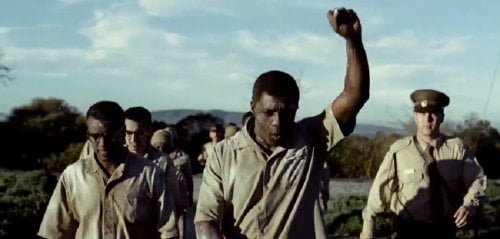Mandela: The Long Walk to Freedom

Nelson Mandela first became involved in the movement to free black South Africans back in the early 1940s. We know that the man would be imprisoned for 27 years for his activism and, in 1994, became the first freely elected black president of that country. The events that made the man are examined over the 50+ years prior to that election in “Mandela: Long Walk to Freedom.”
Laura's Review: C+
Robin's Review: C+
This is an old-fashioned type of biopic that painstakingly chronicles the five decades leading to Mandela’s election to the South African presidency. Starting in 1942, we meet Nelson as a young attorney facing the white prejudice of the South African courts. When a drunken black man is arrested by the police and beaten to death, the seeds of the anti-apartheid movement are planted in Mandela. “Mandela: Long Walk to Freedom” is based on his memoirs of the same name and adapted for the screen by William Nicholson. Director Justin Chadwick follows Nelson’s life by highlighting his non-violent radicalism to get the black vote, protesting the unjust apartheid policies and his arrest for boarding a “white only” train. Of course, much time is spent on his longtime and often rocky relationship with Winnie Madikizela (Naomi Harris), his wife and sometimes political opponent. Time is spent to show the horrors of the minority white apartheid government on its majority black and colored population. The film shows those major incidents that would eventually lead to national freedom - the mandatory segregation of the black Soweto ghetto in Johannesburg in 1948 and the 1960 Sharpeville protest against the mandatory pass law that ended in carnage when police fire on the non-violent demonstration, shooting many in the back. These and other horrific events push Mandela to increasingly bold acts of protest that culminate in his arrest and conviction for high treason. Fortunately, for South Africa and the world, a bargain was made and his death sentence was commuted to life in prison. Mandela was sent to Robben Island Prison, then Pollsmoor Prison, then Victor Vester Prison where, despite the harsh treatment over many years, his radicalization against apartheid gained strength. He questioned the authority of his wardens and led a protest to allow Black prisoners to be issued long pants long pants. It may not seem like much but the protest but it was just a step that would eventually lead to his freedom. The filmmakers certainly do an earnest job in showing 50 years of the anti-apartheid movement through the eyes of Mandela. Idris Elba seems like an odd choice to play Nelson Mandela. The actor seems too physically large to play the role and I kept resisting him personifying the man. It is only later in the film that I started to “get” Elba as older Mandela. Naomi Harris gives life to her Winnie but the rest of the cast are not fully drawn. The old-fashioned biopics of the 1930s and 40s fell out of favor to moviegoers with the exception of “Gandhi” in 1982. That film, with its big budget and huge name cast, was a grand, sprawling epic. “Mandela: The Long Walk to Freedom” is not “Gandhi.” The film’s heart is in the right place but so much of Nelson Mandela’s life is covered, the whole movie feels rushed. It is, as I said, an earnest effort but not a great one.

